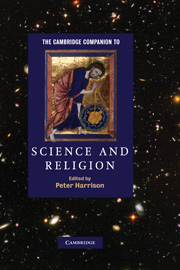Book contents
- Frontmatter
- Introduction
- Part I Historical interactions
- 1 The fate of science in patristic and medieval Christendom
- 2 Religion and the Scientific Revolution
- 3 Natural theology and the sciences
- 4 Religious reactions to Darwin
- 5 Science and secularization
- Part II Religion and contemporary science
- Part III Philosophical perspectives
- A guide to further reading
- Index
1 - The fate of science in patristic and medieval Christendom
from Part I - Historical interactions
Published online by Cambridge University Press: 28 July 2010
- Frontmatter
- Introduction
- Part I Historical interactions
- 1 The fate of science in patristic and medieval Christendom
- 2 Religion and the Scientific Revolution
- 3 Natural theology and the sciences
- 4 Religious reactions to Darwin
- 5 Science and secularization
- Part II Religion and contemporary science
- Part III Philosophical perspectives
- A guide to further reading
- Index
Summary
“The pagan party . . . asserted that knowledge is to be obtained only by the laborious exercise of human observation and human reason. The Christian party asserted that all knowledge is to be found in the Scriptures and in the traditions of the Church; that, in the written revelation, God had not only given a criterion of truth, but had furnished us with all that he intended us to know. The Scriptures, therefore, contain the sum, the end of all knowledge. The clergy, with the emperor at their back, would endure no intellectual competition. / [O]ne finds a combination of factors behind 'the closing of the Western mind': the attack on Greek philosophy by [the apostle] Paul, the adoption of Platonism by Christian theologians and the enforcement of orthodoxy by emperors desperate to keep good order. The imposition of orthodoxy went hand in hand with a stifling of any form of independent reasoning. By the fifth century, not only has rational thought been suppressed, but there has been a substitution for it of 'mystery, magic, and authority.'” / A widespread myth that refuses to die, illustrated by these two quotations, maintains that consistent opposition of the Christian church to rational thought in general and the natural sciences in particular, throughout the patristic and medieval periods, retarded the development of a viable scientific tradition, thereby delaying the Scientific Revolution and the origins of modern science by more than a millennium. Historical scholarship of the past half-century demonstrates that the truth is otherwise.
- Type
- Chapter
- Information
- The Cambridge Companion to Science and Religion , pp. 21 - 38Publisher: Cambridge University PressPrint publication year: 2010
- 7
- Cited by



